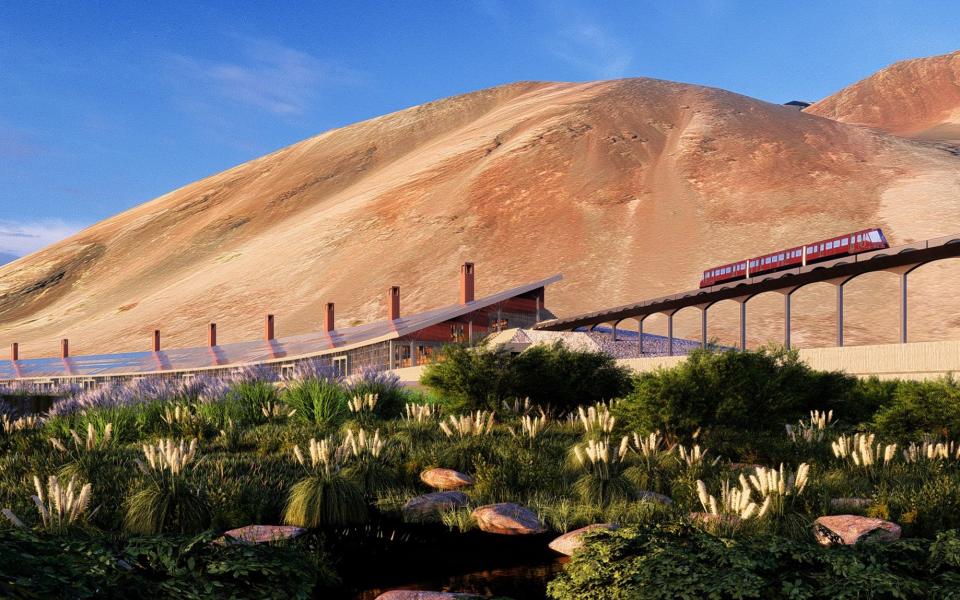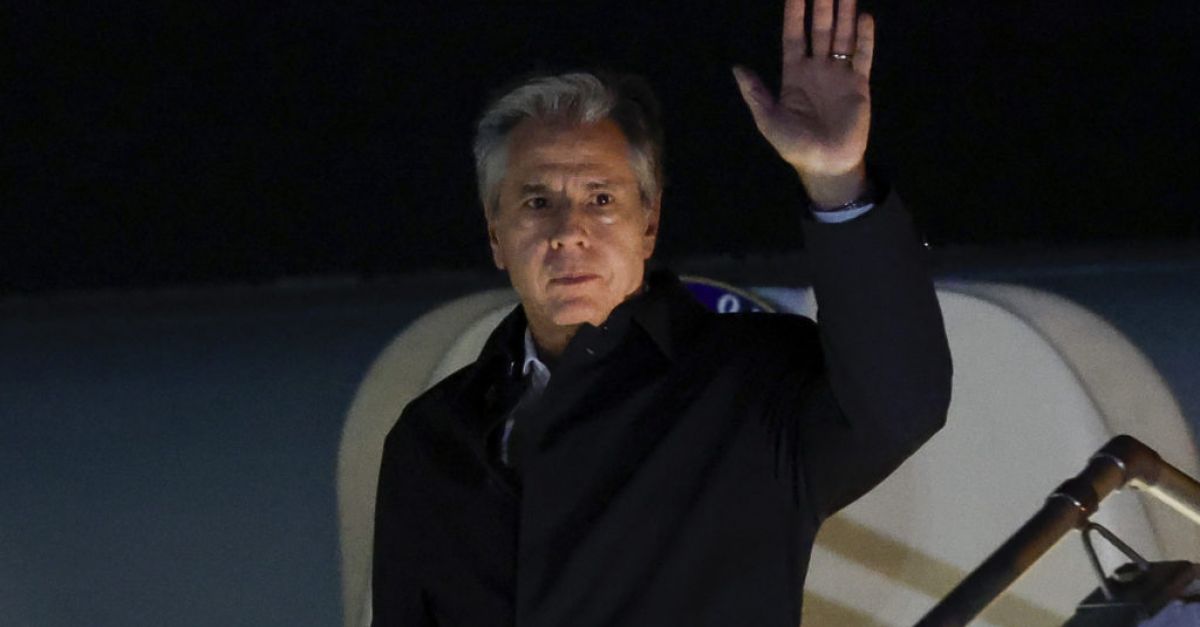The Los Azules mining project is nestled in a beautiful yet austere stretch of the Andes. Just a few miles from the border with Chile, it is one of the quietest and most remote parts of Argentina.
Yet below the site’s surface lies one of the world’s 20 biggest copper deposits – a vast treasure trove of riches at a time when mining companies are scrambling for new supplies.
The switch to green energy has turned copper into “the new oil”, according to Goldman Sachs. The red metal is sought for its high electrical conductivity and will be needed for every part of the transition – from wind turbines to batteries and electric cars.
Currently, it looks like there won’t be enough. According to research firm CRU Group, miners needed to invest an extra $150bn (£118bn) between now and 2032 to avoid global shortages.
The global scramble for copper could deliver vast riches to countries that have it – and Javier Milei, Argentina’s swashbuckling new president, wants to take advantage.
He hopes his country’s massive reserves can help lift its embattled economy out of the doldrums.
To do so, the wild-haired economist, who has brandished a chainsaw in public appearances to ram home his message of cutting back the state, will need to bring in foreign investors and convince them their assets are safe from government meddling.
In a bid to woo overseas businesses, he is pushing through a package of economic reforms, including mining incentives known collectively as RIGI, which were approved by the country’s Senate on Thursday.
Reforms go well beyond mining and the package has proved controversial, provoking violent protests between demonstrators and police in Buenos Aires last week. Some Argentinians fear Milei’s overhaul will further fuel unemployment and inflation.
Milei is betting that Argentina can grow its way out of trouble. Mining is a particularly promising sector in this regard, with Argentina’s abundant supplies of lithium and copper setting it up as a key player in future green energy supply chains.
At the moment Argentina produces almost no copper, despite having similar geology to neighbouring Chile – the world’s biggest producer, which churns out a quarter of global supplies.
Many observers now expect that to change rapidly, should Milei get his way.
“I think Argentina will now become a huge rival to Chile,” Marcelo Awad, the former chief executive of mining giant Antofagasta, told Bloomberg this year.
Falling within the “neogene metallogenic belt” in north-west Argentina, Los Azules is one of several copper prospects being developed. It is being led by Rob McEwan, a Canadian mining tycoon who first invested in Los Azules back in 2007.
Until now, Argentina was low down on the list of investment targets drawn up by many mining companies.
“Argentina is very well-endowed with natural resources but the country was poisoned by the policies of previous governments and put to sleep,” says McEwen.
The businessman, who met Milei in person a month and a half ago, likens the president’s overhaul of the country to the fairy tale Sleeping Beauty.
“Milei is the prince kissing sleeping beauty and waking her up.”
Alongside McEwen, companies including London-listed miners Glencore and Rio Tinto, as well as Vancouver-based First Quantum Minerals, are now also interested in Argentina’s copper.
As well as Milei’s reforms, the insatiable need for the metal is also drawing investors back in.
“Miners are not spoilt for choice at the moment when it comes to projects,” says Michael Widmer, head of metals research at Bank of America.
“But they need that copper. So it means they’re much more willing to invest in destinations they wouldn’t have previously considered.”
However, the industry is wary. Miners are coming off what Widmer describes as a “10-year bear market”, when they took on huge debts and invested in commodities only to see their bets soured by slowing growth in minerals-hungry China.
As a result, companies are much more cautious about investing this time round, with the big players waiting for highly attractive economics.
Copper futures recently surged as high as $5.20 per pound in May, amid excitement about BHP’s later-aborted takeover of Anglo-American. However, prices have since fallen back to around $4.5 per pound, or just below $10,000 per tonne.
Widmer believes they will need to rise to between $13,000 and $14,000 per tonne to attract serious investment.
The numbers already stack up for McEwen. The Canadian says his project will be able to extract copper for $1.64 per pound, all in. At current market prices, that suggests a healthy profit.
Los Azules is expected to yield 400,000 pounds of copper annually and have a lifespan of 27 years, generating thousands of construction jobs and around 1,000 permanent roles for workers running the facility.
McEwen and his company control 60pc of McEwen Copper, the venture that owns the Los Azules project. The project has also secured backing from European car giant Stellantis – the owner of Vauxhall and Fiat – and mining giant Rio Tinto, which own about 19pc and 15pc respectively.

The main outstanding hurdle is securing regulatory approvals, a task that has become more difficult across the world as governments put in place ever-stricter environmental standards.
To address local concerns and obtain a “social licence”, McEwen says his company is using methods that use just 25pc of the water used by traditional mines. It will also employ renewable electricity for power.
McEwen is promising to build a hotel and indoor gardens as part of the mine in a somewhat ambitious attempt to turn the development into a destination for “eco tourists”.
“I want to create this sparkle on the landscape,” he says. “And I’ve always felt that if we can create something that is of beauty, we will start to change perceptions of the mining industry.
“We want to create a very comfortable, safe, restful place for people to work. And we need to be able to attract the best people, because we’re quite a way out from communities up in the mountains.”
Mining industry raises incomes across economy
McEwen and his colleagues are also stressing the economic benefits of mining.
At home in Canada, he points out, the industry has lifted incomes across the economy.
“The mining industry in Canada is the second-highest paying industry in the country. It takes in all kinds of disciplines as well, from environmental controls to community relations and even artificial intelligence now.
With the right conditions, he believes mining could have the same positive impact in Argentina.
“It will bring big benefits to the area and it will be a multi-generational project,” McEwen says.
Bigger mining firms are also moving in. Last year, Glencore took 100pc ownership of its Mara copper project in the Catamarca province after buying the remaining 56.25pc it didn’t own from Canada’s Pan American Silver.
The company also owns the El Pachón copper project in the San Juan province.
Glencore expects Mara alone to produce 200,000 tonnes of copper per year once fully up and running. Gary Nagle, the company’s boss, has bet big on the red metal and has repeatedly warned that a supply crunch is coming.
McEwan is hopeful about the prospects of Los Azules, which will entail $2.5bn of investment alone. Construction is slated to begin in 2026 – about half way into Milei’s first term – with production following by late 2029 if all goes to plan. Barring a significant about-turn, the global net zero sprint will by then be well under way – and hungry for copper.
For Milei, investments like this might help to deliver the economic boom Argentina so desperately needs. The chainsaw economist is attempting alchemy: transmuting Argentina’s vast copper reserves into gold.
Signup bonus from





